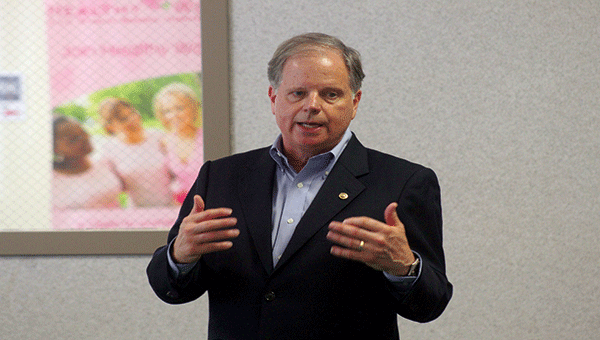Sen. Doug Jones attends rural healthcare forum at L.V. Stabler
Published 2:18 pm Monday, June 4, 2018
|
Getting your Trinity Audio player ready...
|
Healthcare is an issue that effects everyone at some point, and rural areas such as Butler County and much of Southern Alabama struggle to provide adequate care, lure and retain healthcare professionals, and overcome the wage index.
U.S. Senator Doug Jones (D-Ala.) attended a healthcare forum at L.V. Stabler In Greenville on Thursday.
Local officials joined healthcare providers and administrators from Greenville, Georgiana, Opp, Andalusia, Camden, Demopolis, Crenshaw County and Union Springs to ask questions and offer solutions directly to Jones in the roundtable-style discussion.
Greenville Mayor Dexter McLendon introduced Jones, saying “The Senator is here because he cares about what is going on. He knows we’re in a crisis situation in rural healthcare… 86 percent of rural hospitals in Alabama are losing money. We’re not trying to get rich, but we have to pay the bills.”
Specifically, as McLendon pointed out in an interview preceding the forum, “[the] city took over the hospital in November. At that time, it was losing about $2.4 million a year. It’s still on pace to lose that much again.”
Jones spoke briefly before fielding questions from attendees.
“Rural health, and healthcare in general, is still probably the dominant issue facing the state of Alabama,” Jones said.
Jones is on the Senate Health, Education, Labor and Pensions Committee, and said that healthcare has been a priority for him since elected.
The discussion portion of the forum provided an overview of issues facing rural hospitals and healthcare providers, and questions came from physicians such as Dr. Danny Hood and Dr. Norman McGowin, officials such as Jesse McWilliams, and many of the gathered administrators.
Other questions and points included the challenge of attracting and retaining physicians in rural areas, the wage index that places priority on urban hospitals, the lack of funding for Medicare and Medicaid, the upsides and downsides of the Affordable Care Act, and the wide-ranging effects of the opioid crisis.
Particular focus was given to the problem of the wage index, and the problems stemming from the fact that rural hospitals (and hospitals in less wealthy states such as Alabama in general) are often not compensated nearly as much as large hospitals for equivalent care and procedures.
Recently, Jones introduced The Rural Health Liaison Act, which would create a rural health-focused position within the U.S. Department of Agriculture.
According to Jones, the liaison position is designed to “streamline government,” and would:
- Consult with the Department of Health and Human Services (HHS) on rural health issues and improve communication with all federal agencies
- Provide expertise on rural health care issues
- Lead and coordinate strategic planning on rural health activities within the USDA
- Advocate on behalf of the health care and relevant infrastructure needs in rural areas
- Provide updates on rural grant opportunities and other programs to stakeholders
- Provide technical assistance and guidance on rural health to the USDA extension and county offices
Jones explained that the USDA’s hand in “rural development” and funding makes it an ideal department to place a position focusing on rural healthcare.
At the end of the meeting, McLendon proposed that the attendees continue the open-forum style meetings even in the absence of Senator Jones, and suggested choosing a representative to send to Washington to lobby for the specific needs facing healthcare providers in south Alabama.
“We have to do something, and I get chill-bumps when I say that,” McLendon said to attendees. “Because it is absolutely awful what we are faced with… this thing’s so big, we’re talking about not having a hospital one day.”
L.V. Stabler CEO Donny Rentfroe said the opportunity to express concerns directly to a sitting U.S. Senator was something many local healthcare workers were eager to seize on and has potential to improve the situation.
“I think anytime you can get healthcare leaders and the politicians [who] are responsible for the policy of funding healthcare and understanding the important economic and quality of care impacts of hospitals in the room together, you have the opportunity for positive outcomes.”






